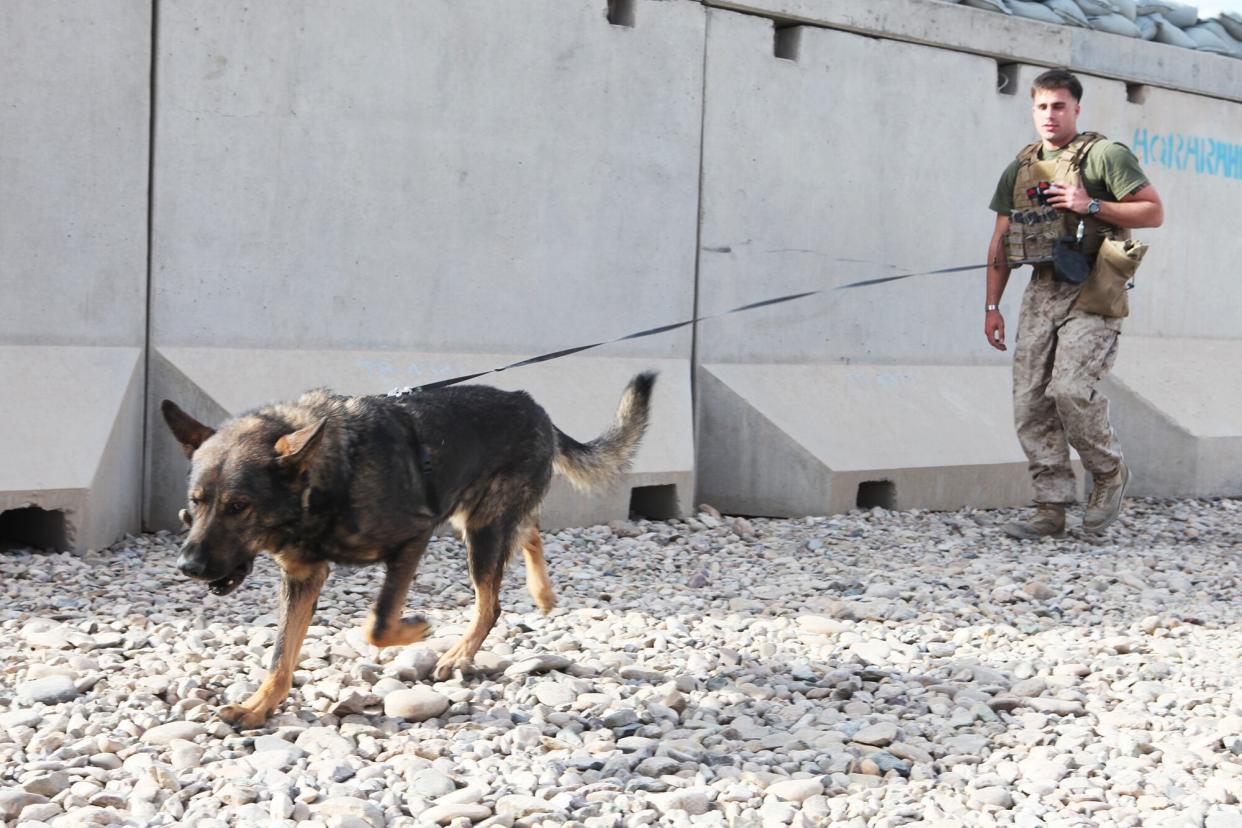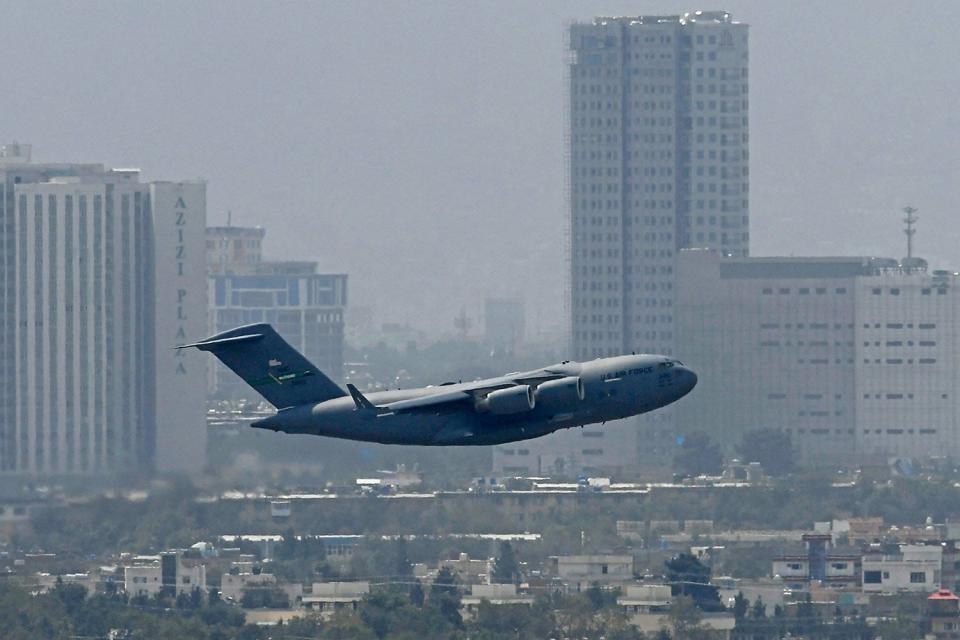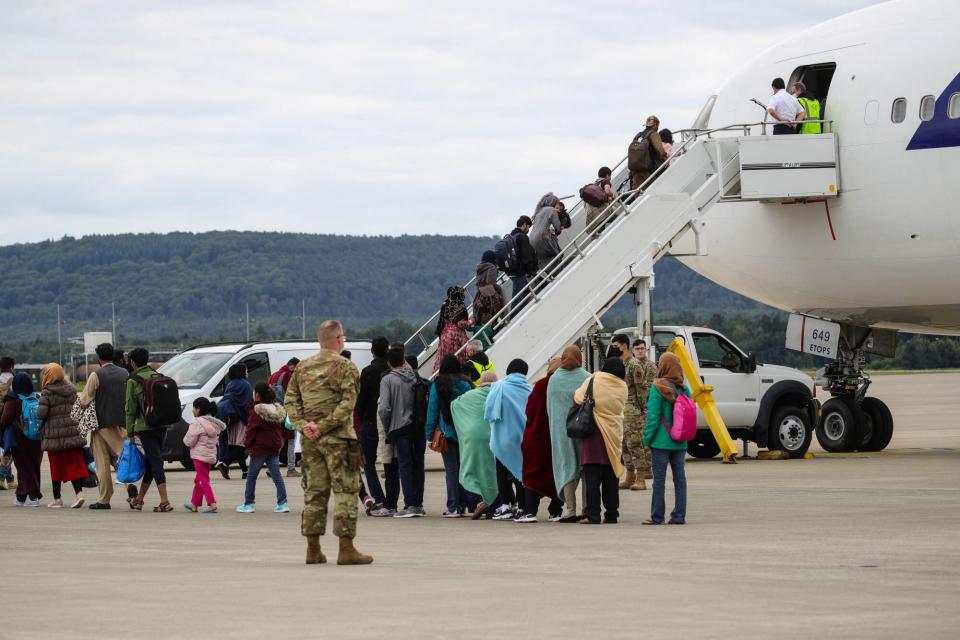Military Dogs Weren't Left Behind in Afghanistan, Pentagon Says

U.S. Marine Corps photo by Sgt. Keonaona C. Paulo Military working dog demonstration
The Department of Defense is knocking down reports that a number of dogs working with the military were allegedly left behind as the U.S. finalized its exit from Afghanistan this week.
A Pentagon spokesman tells PEOPLE these stories are "erroneous" and that "our military working dogs were safely evacuated."
Photos showing dogs in cages did not depict "dogs under the care of the U.S. military," the spokesman said.
The denial comes after American Humane — a nonprofit that promotes animal welfare and safety — issued a statement Monday claiming the U.S. was "leaving behind brave U.S. military contract working dogs to be tortured and killed at the hand of our enemies."
A spokesman for the group did not respond to a call and email seeking further comment.
The claim led to fury among some social media users and a spate of headlines — which the government says are wrong as they regard military dogs specifically.
Defense spokesman Eric Pahon tells PEOPLE that troops also did not leave any dogs in cages at the Kabul airport amid the evacuation operation.
"The U.S. priority mission was the evacuation of U.S. citizens, SIV [participants in a special visa program] and vulnerable Afghans," Pahon says. "However, to correct erroneous reports, the U.S. military did not leave any dogs in cages at Hamid Karzai International Airport, to include the reported 'military working dogs.' "
He continued: "Photos circulating online were animals under the care of the Kabul Small Animal Rescue, not dogs under the care of the U.S. military. Despite an ongoing complicated and dangerous retrograde [withdrawal] mission, U.S. forces went to great lengths to assist the Kabul Small Animal Rescue as much as possible."

AAMIR QURESHI/getty A U.S. Air Force aircraft takes off from the airport in Kabul, Afghanistan, on Monday.
In addition to the military dogs whom the Pentagon says were evacuated, there are other groups of pets in need in Afghanistan, which may be fueling the conflicting reports.
Animal rescues and advocates have said they need to get their cats and dogs out of the country after the Taliban takeover.
Military contractors and others working with the U.S. military also may have their own animals helping them, but they would not have been under the purview of American forces.
A separate source echoed the Pentagon's official explanation, telling PEOPLE that "this one is unfolding minute by minute, but the one connecting thread is that the dogs are not U.S. military dogs."
"Many of the dogs [with Kabul Small Animal Rescue] had worked with contractors," this source says. "The dogs were not given to local families because the Taliban bans pet ownership."
The source notes that, culturally, dogs are seen by many in Afghanistan as "unclean."
According to a Monday update on the website of the SPCAI, the animals under the care of Kabul Small Animal Rescue include 130 dogs, some of whom were pets of Americans living in Afghanistan, whose whereabouts are not entirely clear.
RELATED: The Afghanistan War Ends: Last U.S. Plane Leaves After 20 Years — and Evacuation of 120,000
According to the update, staff with the Kabul Small Animal Rescue were informed on Monday that most of their dogs "had to be released into the airport" in Kabul as it was evacuated — "turning once rescued shelter dogs into homeless strays," the statement read.
"We haven't been able to confirm the number of dogs released, nor can we confirm whether the U.S. Military evacuated the 46 working dogs that had been under KSAR's care when they left," the update read. "We are urgently pressing for more details, and while this is more difficult now that the U.S. military has completely evacuated Kabul, we refuse to give up."
The animal rescue organization said that its primary objective was now "to return to the airport– when it is safe and with the hope of Taliban cooperation–to try and retrieve or re-rescue the animals who were released at the airport. The situation at the airport remains very unsafe, but KSAR is hopeful their staff will be allowed to return to the airport at some point to try to save their dogs."

ARMANDO BABANI/AFP via Getty
American Humane said in its earlier statement that it stood "ready" to transport what it claimed were "contract K-9 soldiers."
According to its statement, American Humane has worked with the military for decades, and has previously rescued animals from the battlefields of war.
Gen. Kenneth F. McKenzie Jr., the head of U.S. Central Command, announced the American military's completed withdrawal of Afghanistan during a last-minute press briefing on Monday afternoon.
The withdrawal announcement came hours earlier than was publicly expected and, as McKenzie spoke, he said, the "last manned aircraft" was "now clearing the air space above Afghanistan."
The U.S. controlled Hamid Karzai International Airport since mid-August, after the Afghan government fell to the Taliban during the planned military withdrawal.
The U.S. has since facilitated the evacuation of more than 120,000 people including U.S. citizens and Afghans seeking refuge from the feared tyranny of the militant group, which ruled the country prior to the U.S. invasion in 2001.
Much of the successful evacuation efforts — which the White House said was a major logistical feat — were overshadowed by early scenes of chaos and violence at the Kabul airport, which fueled fierce criticism.
If you would like to support those in need during the upheaval in Afghanistan, consider:
* Donating to UNICEF to aid Afghans in the country or
* Donating to the International Refugee Assistance Project to help those fleeing.

